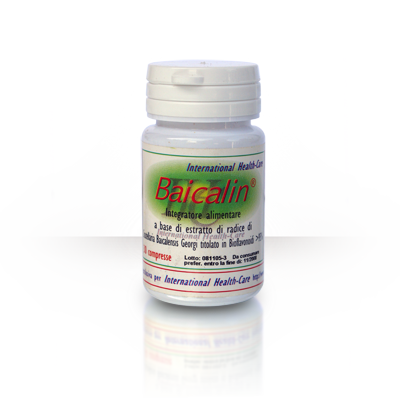
Baicalin cod. 902580012 € 29,00
PURE EXTRACT (>95% 5,7,4'-trihydroxy-8-methoxyflavone,)
FROM SCUTELLARIA BAICALENSIS GEORGI (ASIAN SKULLCAP)
UNIT 30 TABLETS
POTENCY (x SERVING TWO TABLETS): 973 mg baicalin (5,7,4'-trihydroxy-8-methoxyflavone)
Anti-Viral Infectives: Neuraminidase Inhibitors
There has been
much talk about Tamiflu and the possibility that it can curb the
reproduction of the H5N1 virus. Tamiflu works by inhibiting an
enzyme called neuraminidase (aka sialidase). This enzyme is used by
many virus particles to attach to cells and invade them. When a
neuraminidase inhibitor like Tamiflu is administered, it can reduce
the spread of Type A influenza in the population. It can also
shorten the duration and intensity of Type A influenza if
administered in the first 48 hours after symptoms appear (it
typically reduces a 5-7 day influenza episode by 1 to 2 days).
The strategic use of neuraminidase inhibitors can probably help keep
a lid on small outbreaks of the virus. But if a larger epidemic
occurs, supplies will probably run short. Viruses have demonstrated
the ability to mutate and become resistant to Tamiflu, which could
be a problem over time.
There are natural neuramidase inhibitors
found in plants: the most widely studied is a compound called
5,7,4'-trihydroxy-8-methoxyflavone, which
is found in the herb Scutellaria (commonly called scullcap or
skullcap). In a study on mice cells, bathing the cell cultures in
Scutellaria tea inhibited both Type A (H3N2 type) and Type B (Ibaraki/2/85
type) influenza when the flavone was administered 18 hours before
the virus challenge. (it significantly inhibited their
proliferation in the mouse lung when administered intranasally 7
times (total 3.5 mg/kg) from 18 h before to 54 h after virus
infection.
(citation)